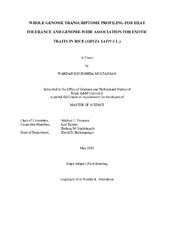| dc.description.abstract | High night temperature (HNT) has strong negative effects on rice plant growth and development. HNT also impacts many physiological characteristics of rice which affect the grain quality of rice grown around the world. One potential mechanism of HNT damage is from the induction of ethylene-triggered reactive oxygen species that can lead to increased membrane damage and negatively impact yield and grain quality. In this study, the changes in physiological behavior due to the interaction between HNT and the ethylene-inhibitor 1-MCP was investigated. Furthermore, genome-wide expression analysis under HNT was performed using RNA-Seq to gain insights into the gene functions underlying tolerance to HNT. Plants were grown under ambient night temperature (ANT) (25 °C) or HNT (30 °C) with or without 1-MCP treatment. RNA extraction was performed on two phenotype-contrasting rice cultivars (Antonio and Colorado) from which in-depth RNA-Seq analysis was used to identify differentially expressed genes involved in heat tolerance in these varieties. Results from this experiment showed a total of 25 transcripts derived from analyzing the effects of various comparisons of treatments on the genotypes used in this study. From these findings we conclude that notable transcripts in this subset played a role in molecular mechanisms pertaining to ethylene interaction and HNT.
High temperature environments are fairly innocuous for some exotic rice varieties; however, these genetic donors for heat tolerance often have various undesirable traits, including red pericarp, black hulls, and awns. To improve the efficiency of using these exotic accessions in modern rice breeding programs, it would be benficial to develop improved genetic donors by eliminating these exotic traits and thus preventing negative linkage drag when using these donors as parents in a crossing program. Recent advances in CRISPR/Cas9 genome editing can now enable the rapid knock-out of genes underlying negative traits in rice. To gain further insight in the genetic loci controlling these traits, a genome-wide association study (GWAS) was performed on a diversity panel consisting of approximately 300 rice accessions. Traits of interest in this GWAS study included pericarp color, hull color, awn color, and awn length. The accessions were genotyped with an Illumina 7K rice SNP chip to identify genetic loci that control these traits. Results from this GWAS study showed various significant SNPs for exotic rice traits, awn color (chr: 9 & 10), awn length (chr: 4,6,7, 10, and 12 ), hull color (chr: 12), endosperm color (chr: 1 & 3). These findings may lead to the conclusion that may potentially be novel QTLs. When combined with data on the chromosomal location of known major genes affecting exotic traits, these results can guide the development of improved HNT-tolerant genetic donors for future stress-tolerance breeding programs. | en |


